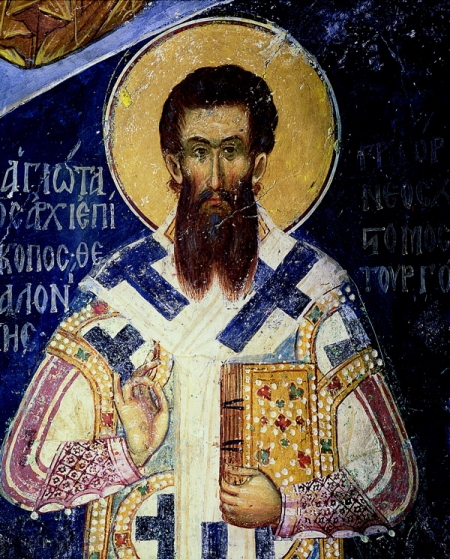The second Sunday of Great Lent is known in the Orthodox Christian Church as the Sunday of St. Gregory of Palamas. There is much to learn from the life of St. Gregory! The way that he lived his life on earth teaches us and our children how to live a truly Christian life.
St. Gregory was born to a wealthy family, but loved God and the Church so much even from childhood that he joined the monastic ranks at a young age. He also convinced many of his family members to do the same! He is known for his life of prayer and his theological wisdom, which came about as a result of that life of prayer. Let us learn more about St. Gregory so that we are better able to teach our children about his life, and then let us work together to apply our learnings and become more Christlike, as he was.
Here are a few resources that can help us to learn about St. Gregory of Palamas’ life:
- Sister Vassa tells a brief version of St. Gregory’s life (sprinkled with her usual dose of humor) at https://www.youtube.com/watch?v=XyyDafSDPXc.
- Fr. John Palmer tells the story (in great detail) of St. Gregory’s life at https://www.youtube.com/watch?v=XdDEuTL1rEo.
- Read about the saint’s life at http://sgpm.goarch.org/Monastery/?page_id=33, where you will find stories of amazing things that happened to him and miracles God worked through his prayers.
- Metropolitan Kallistos Ware of thrice-blessed memory speaks about the saint and his teachings at https://www.youtube.com/watch?v=diizpNIUIqc.
Here are a few resources that can help us apply what we are learning about St. Gregory’s life:
- A family discussion of the life of St. Gregory combined with the Gospel reading for the second Sunday of Lent can be found at http://lent.goarch.org/family/2ndsundayoflent.asp. This is an excellent resource to help families talk together about the Sunday’s Gospel reading, learn more about the saint’s life, and discuss how both can help us live more Godly lives. The link also offers a few practical ways that families can apply the lessons.
- Find a printable coloring page of St. Gregory at https://antiochianprodsa.blob.core.windows.net/websiteattachments/St%20Gregory%20Palamas%20Line%20Drawing.pdf
- Find a daily suggestion of an idea that can help your family learn more about St. Gregory of Palamas and apply those learnings, at https://antiochianprodsa.blob.core.windows.net/websiteattachments/Updated_great%20lent%20and%20holy%20week%20activity%20calendar.pdf.
Learning about the life of St. Gregory of Palamas can greatly strengthen our theological understanding. Teaching our children about his life will aid our appreciation for the way that he lived his earthly life as we see his deep love for God and how that translated into his daily life. Finding ways for our family to emulate his life will help us to work toward godliness, as well. Let us approach this week of Great Lent, seeking to live our lives in godliness, as did St. Gregory of Palamas.
Troparion (Tone 8)
O light of Orthodoxy, teacher of the Church, its confirmation,
O ideal of monks and invincible champion of theologians,
O wonder working Gregory, glory of Thessalonica and preacher of grace,
always intercede before the Lord that our souls may be saved.
Following are quotes from St. Gregory of Palamas:
“Let not one think, my fellow Christian, that only priests and monks need to pray without ceasing and not laymen No, no; every Christian without exception ought to dwell always in prayer.”
“For our love for God is demonstrated above all by the way we endure trials and temptations.”
“When we strive with diligent sobriety to keep watch over our rational faculties, to control and correct them, how else can we succeed in this task except by collecting our mind, which is dispersed abroad through the senses, and bringing it back into the world within, into the heart itself, which is the storehouse of all our thoughts?”
“It is pointless for someone to say that he has faith in God if he does not have the works which go with faith. What benefit were their lamps to the foolish virgins who had no oil (Mt. 25:1-13), namely, deeds of love and compassion?”
“If from one burning lamp someone lights another, then another from that one, and so on in succession, he has light continuously. In the same way, through the Apostles ordaining their successors, and these successors ordaining others, and so on, the grace of the Holy Spirit is handed down through all generations and enlightens all who obey their shepherds and teachers.”
“… Adam chose the treason of the serpent, the originator of evil, in preference to God’s commandment and counsel, and broke the decreed fast. Instead of eternal life he received death and instead of the place of unsullied joy he received this sinful place full of passions and misfortunes, or rather, he was sentenced to Hades and nether darkness. Our nature would have stayed in the infernal regions below the lurking places of the serpent who initially beguiled it, had not Christ come. He started off by fasting (cf. Mk. 1:13) and in the end abolished the serpent’s tyranny, set us free and brought us back to life.”
“Prayer changes from entreaty to thanksgiving, and meditation on the divine truths of faith fills the heart with a sense of jubilation and unimpeachable hope.”

Pingback: Lenten Sundays Series: The Sunday of St. Gregory of Palamas | Orthodox Christian Sunday Church School Teachers